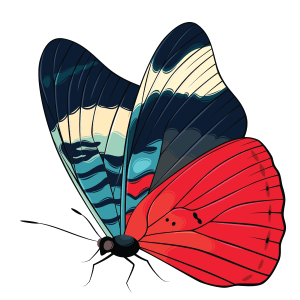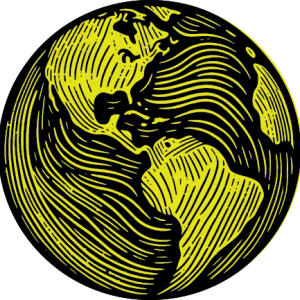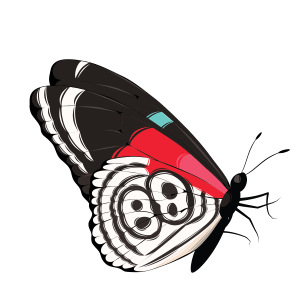October 2024
Remote Media URL
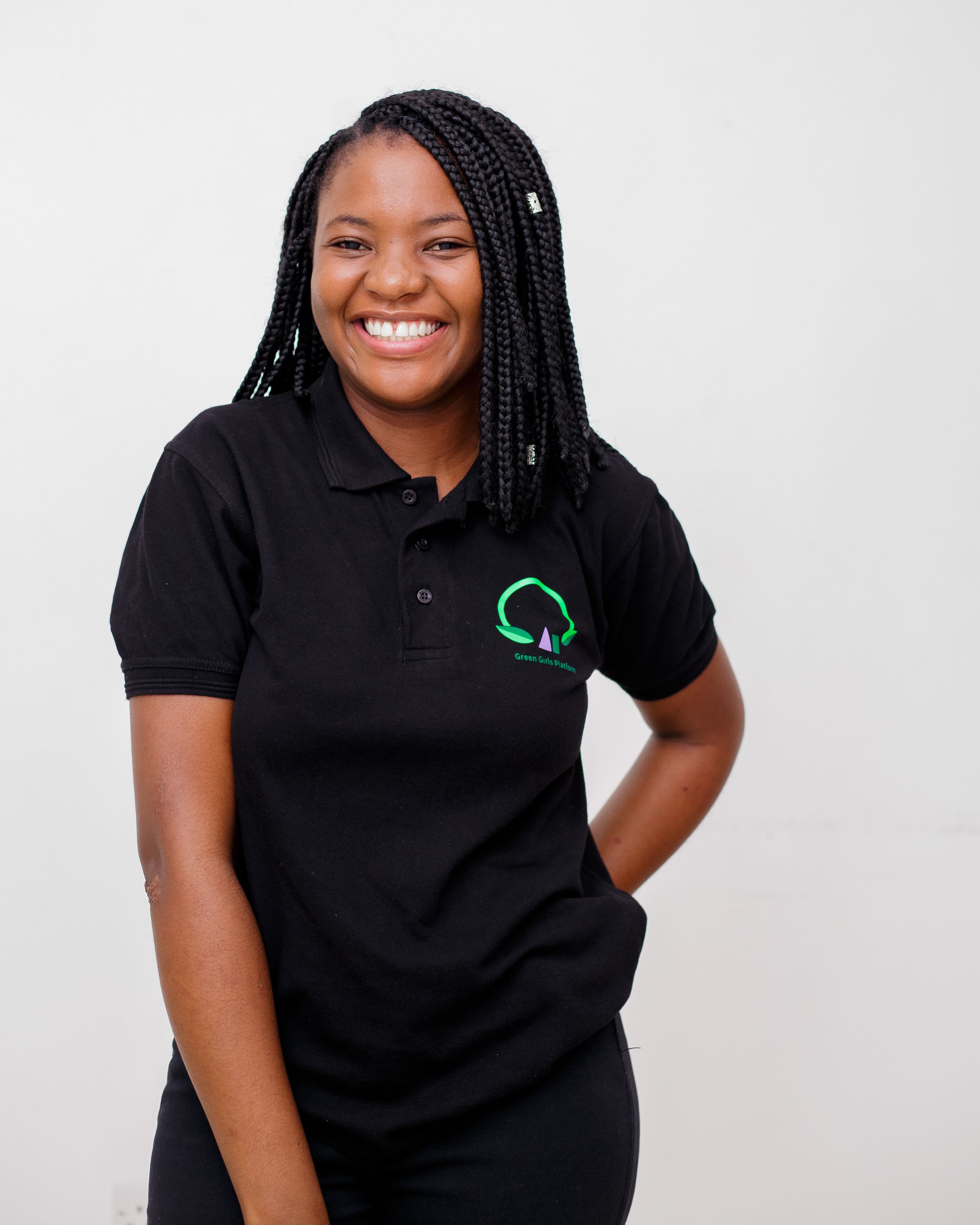
A key component of effective environmental education is working with the communities you're helping, even letting them lead. Joy Munthali, founder of Green Girls Platform, speaks to the process that has led to meaningful partnerships with communities, funders, and future educators.
"We need education that works for young people, education that works for children, and education that works in our context.
And the only way we can learn that is if we are connected, if we have the networks that we need."
As Joy details, part of strong partnerships in mitigating the effects of climate change is creating a safe space for the community to drive solutions. If an organization provides a solution that doesn't fit the culture of the people receiving it, the solution won't be successful and the community won't feel the benefits of those efforts.
"If we have a space that they can just come and share what they think works or what the wildest dream is, and then make that happen, they are assured that this is something that is going to help them to enjoy their human rights."
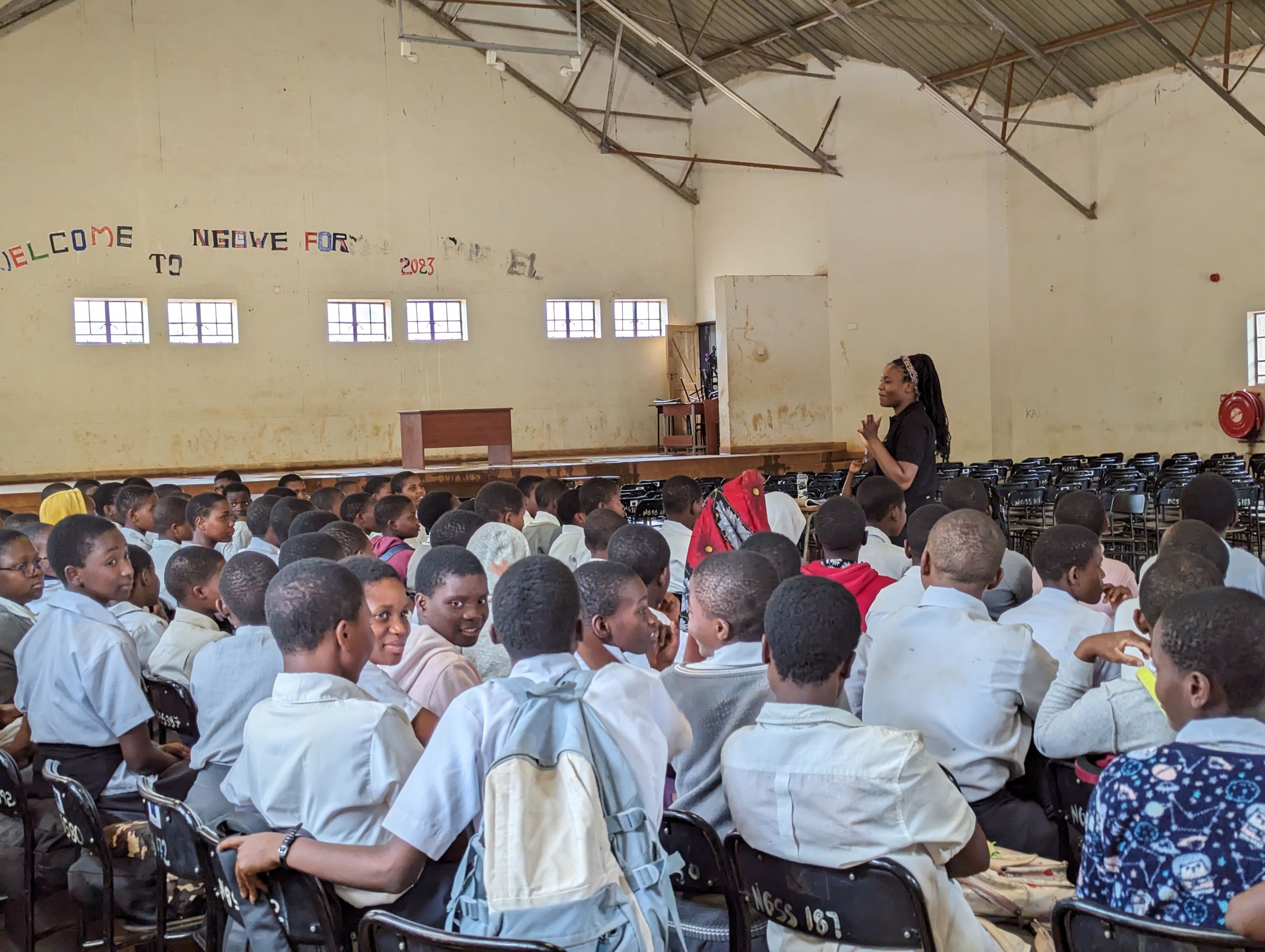
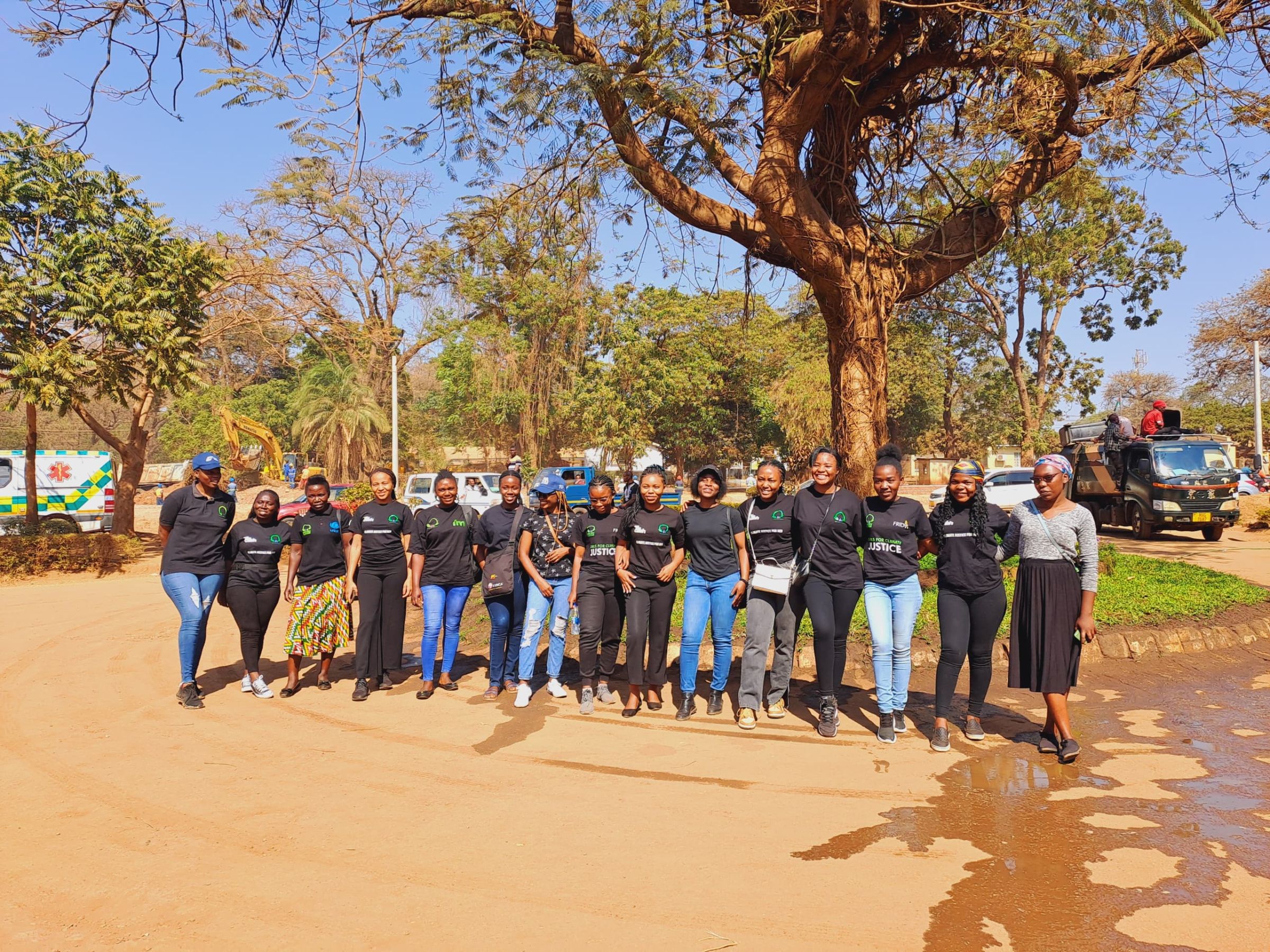
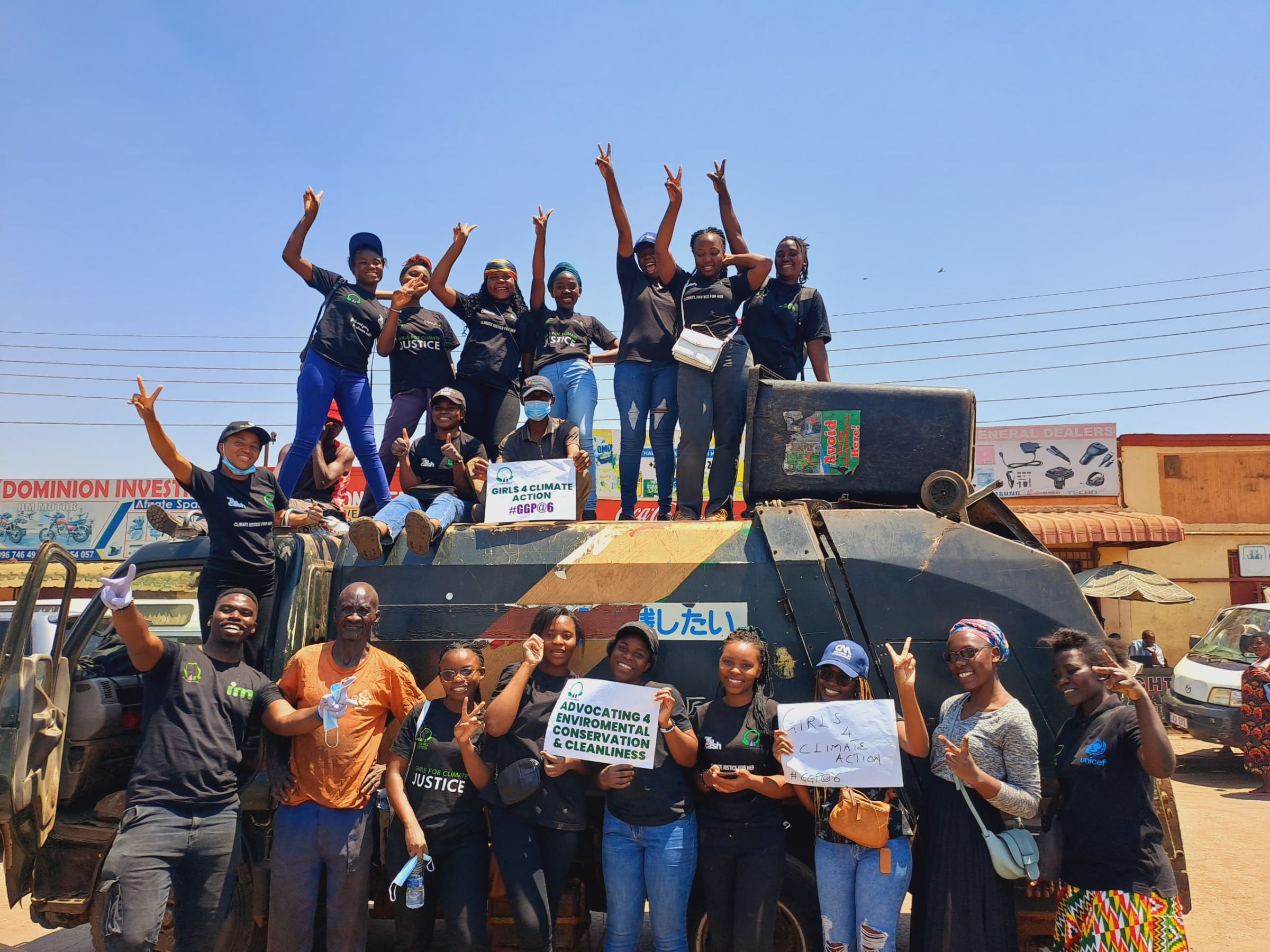
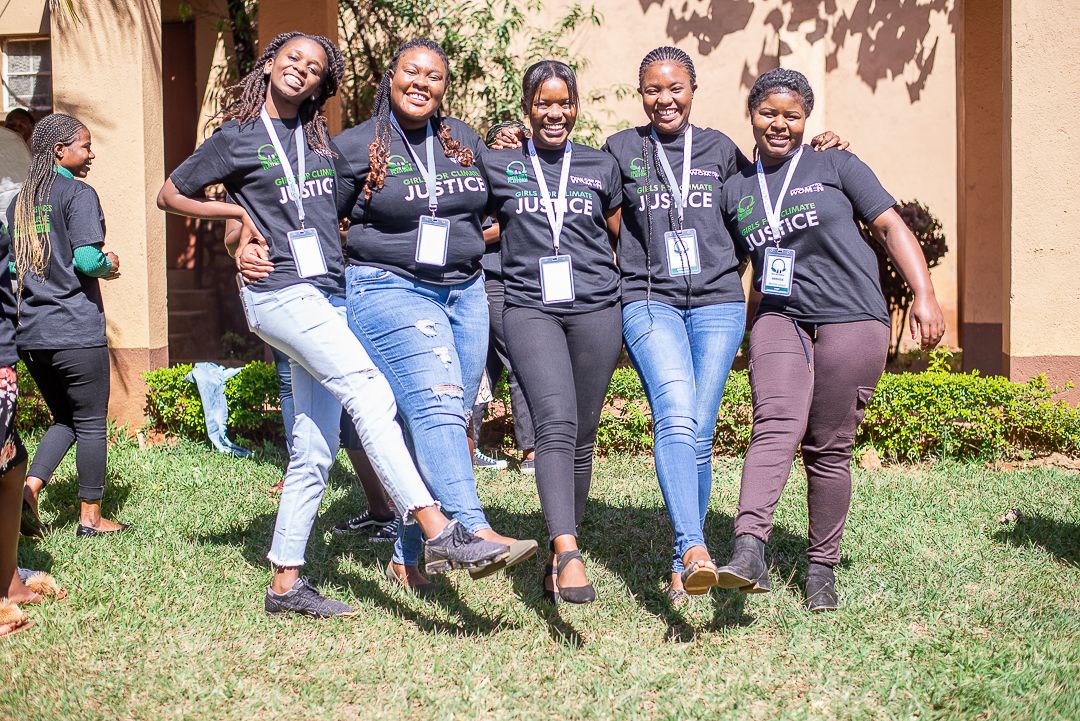
"Three young women went to the [climate change] conference and they were really active, more than the negotiators that were there. And then they were asked, "Where are you guys from? How are you here?" —they say, well we’re from Green Girls Platform, and this was what we do."
Visit the Green Girls website: https://greengirlsplatformmw.org/ and follow Green Girls Platform's journey on Facebook, Instagram, LinkedIn, and Twitter.
To learn more about Green Girls Platform's work in Malawi:
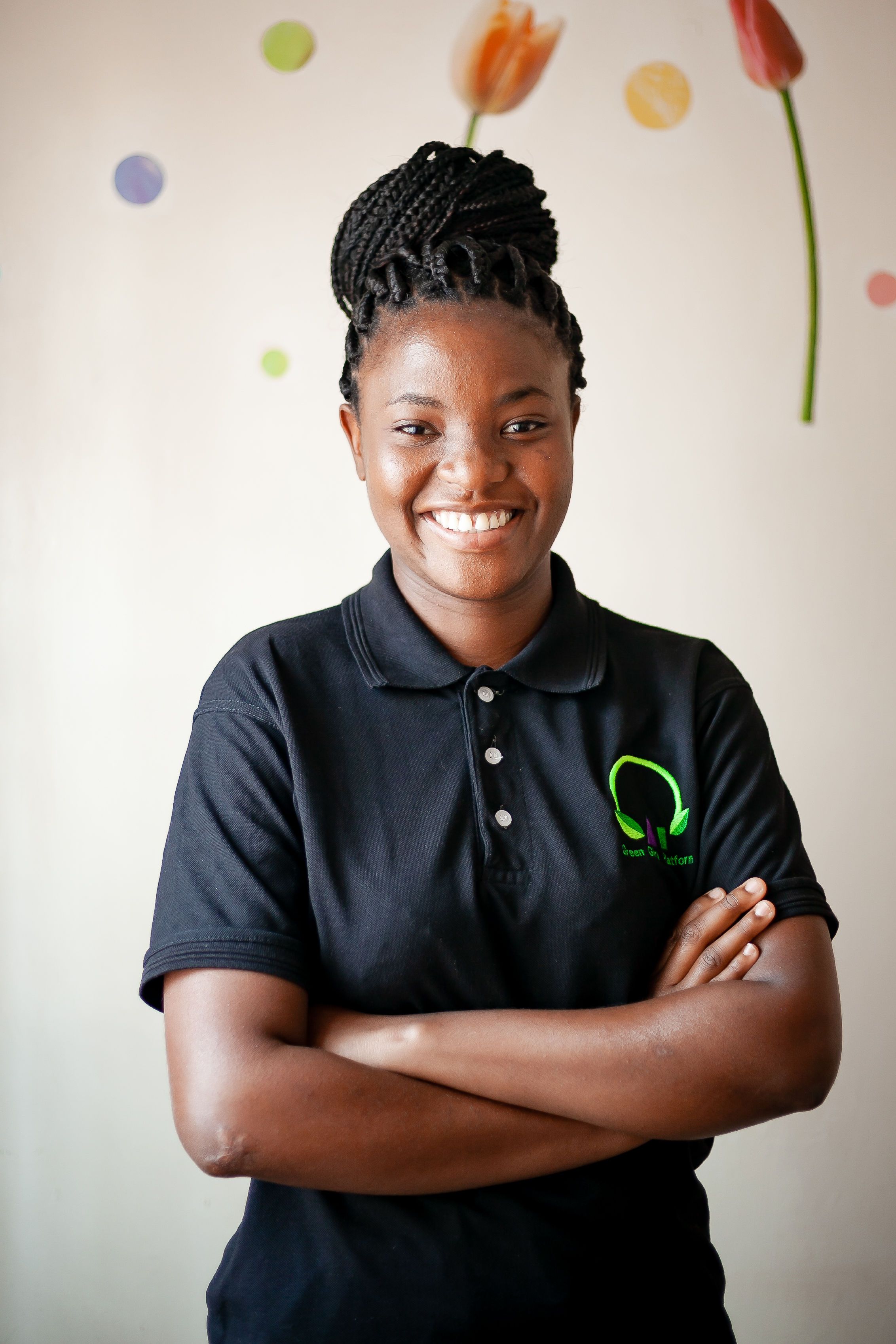
About the Guest Speaker: Joy Hayley Munthali
Joy Hayley Munthali is a passionate environmental educator and the founder of Green Girls Platform, a female-led initiative that works to address the violence that girls and women face due to climate change in Malawi. Green Girls Platform is also the co-founder of We Trust You(th), a global initiative set up to challenge and support youth-focused donors and NGOs to partner with and fund young people more intentionally and equitably. Joy is also an advisor for the Global Resilience Fund.
Joy enjoys voluntary work and working with youth, especially girls and young women, to ensure that their rights in relation to climate change are fully realized. This is what inspired her zeal to set up a platform for girls and young women to combat climate change in Malawi. Joy was Malawi’s Youth Delegate to the Climate Change Conference of Parties 25 (COP25), Youth for Climate: Driving Climate Ambition in 2021, and Powering Action in 2022. Joy is currently pursuing a master’s degree in environment and climate change at Lilongwe University of Agriculture and Natural Resources, where she also attained her bachelor’s degree in environmental science in 2018.
Hear more from Joy about her mission to empower young women with the skills and the network for building a healthier and more sustainable community:
Transcript
00;01;17;23 - 00;01;44;20
Gerry Ellis, Host
Welcome to The World We Want: The NAAEE Podcast. Hi. I'm your host, Gerry Ellis. So, what is the world you want? My guess is you're listening because you've also given it some thought. I know to start, I'd love to see a world of more equitable access to education in order to drive greater sustainability, social justice, well-being, and understanding on the world.
00;01;44;20 - 00;02;09;11
Gerry Ellis, Host
On The World We Want podcast, we talk to some of the great thinkers, creators, educators and conservationists, as well as some of the newest voices driving change around the world. Our conversations are about the world they want and how they are working to build the world we all want. And what do they share in common? Environment education. One of the most powerful tools for creating a more just and sustainable world.
00;02;09;13 - 00;02;24;23
Gerry Ellis, Host
It inspires, it enlightens, it influences attitudes, and most importantly, it drives us to become better guardians of the planet, caretakers of our community. And it leads us to action.
00;02;24;25 - 00;02;50;20
Gerry Ellis, Host
On this episode, we meet one of the newest voices leading environmental education, both in her native home, Malawi, and around the world. Joy Munthali embraced the challenges of environmental education early in life. While in her 20s, Joy founded the Green Girls Platform, a female led initiative that works to address the violence that girls and women face due to climate change in Malawi.
00;02;50;22 - 00;03;22;08
Gerry Ellis, Host
Joy worked in climate change education through empowerment of girls and has promoted E-STEM education. Her work has garnered international recognition. She's represented Malawi at global events like COP and in NAAEE’s EE 30 under 30 program that recognizes young leaders who are using environmental education to create a sustainable future. And if her plate wasn't full enough, Joy recently became an advisor for the Global Environmental Education Partnership, or GEEP.
00;03;22;10 - 00;03;34;03
Gerry Ellis, Host
Yet one more step in Joy’s journey to share her passion and perspectives with the world. And now I'm delighted that Joy is here to share both with us. Hi Joy and welcome to The World We Want.
00;03;34;04 - 00;03;36;08
Joy Hayley Munthali
I'm happy to be here Gerry.
00;03;36;11 - 00;04;05;20
Gerry Ellis, Host
I wanted to start with, you're from Malawi and Malawi is known as the warm heart of Africa. And because, you know, the people there are so generous and friendly. You know, most people in the country, as you know, are descendants of the Bantu, and they've been connected to Malawi for a thousand years. And so they're really connected to the land and to the place.
00;04;05;22 - 00;04;09;08
Gerry Ellis, Host
What was that like growing up as a small girl there?
00;04;09;10 - 00;04;29;08
Joy Hayley Munthali
I could say for me, it's—people have been asking me why I travel for two days and I'm back in Malawi, and I'm always like, I can't leave this country, like everyone in the country treats you like you are from their family. You can't get lost and not be found in Malawi like people will find you and return you.
00;04;29;08 - 00;04;55;28
Joy Hayley Munthali
So, for me it's been that warmth and also something that makes me feel weird when I meet people that are not warm because of me. Like, I grew up with a country where everyone is willing to help and everyone is willing to support you in a different way. And for me as a girl, I used to go to a primary school, a full primary school, there public schools.
00;04;56;01 - 00;05;20;00
Joy Hayley Munthali
And every day, I would meet somebody new. And there was a time when I went there with my shoes, and I left them at school. I went back home barefooted. My mum did not like that, but it was because I had met, another girl in class who didn’t have shoes, and her feet were getting sore because we had to walk to school.
00;05;20;00 - 00;05;37;25
Joy Hayley Munthali
And then I was like, well, my feet are fine so I can give my shoes away. And then I got back home and I found my mom and she was like, where are your shoes? And I said, well, I gave them away. And the next day she went with me to school to look for the other girl because she thought they had taken the shoes away from me.
00;05;37;28 - 00;05;59;16
Joy Hayley Munthali
And so when we got there, when she saw the girl and when she saw what I had done, she actually started a fundraising drive to get shoes for girls. And so for me, that was something that really drove me closer to people, that we could be the support that we need for each other and we don't have to, maybe go outside of our comfort zones just to get help.
00;05;59;19 - 00;06;20;21
Joy Hayley Munthali
And though I have grown up with that, and I have seen that actually translate into people just being kind and how the warmth can really go a long way. And that also helps me to really be trusted easily in communities, because people see what we're doing and they're like, well, we know that girl, and when she comes, this is what she does.
00;06;20;24 - 00;06;23;27
Joy Hayley Munthali
So I think the warmth is—
00;06;23;29 - 00;06;27;22
Gerry Ellis, Host
Yeah, that is an, that is an amazing story.
00;06;29;28 - 00;07;00;12
Gerry Ellis, Host
Do you think that's because I mean, Malawi unfortunately, Malawi is one of the poorest countries in the world. You know, over half the population lives, you know, in poverty or below the poverty line. But at the same time, I think it's like 4/5 of the country. There's, what, 22 million people or something in Malawi. And but about 80% of those people, they earn their living off the land.
00;07;00;14 - 00;07;03;12
Gerry Ellis, Host
And so,
00;07;03;14 - 00;07;04;13
Joy Hayley Munthali
How do you
00;07;04;16 - 00;07;33;19
Gerry Ellis, Host
Think that, thinking about your story in the, in the shoes. I mean, do you think it makes a difference in our willingness to give to others when we all are somewhat equal and in, you know, there's—obviously there's wealthy people in Malawi. But when the vast majority of people are like that little girl going to school with no shoes.
00;07;33;22 - 00;07;38;21
Gerry Ellis, Host
Does it make it easier to connect do you think?
00;07;38;23 - 00;08;01;10
Joy Hayley Munthali
I think it does. To a certain extent. Well, what I have seen is there's some people that if, you're working together and you feel like, well, I have this and my friend doesn't have this, or I own this, and we could really share. I have seen how that has built communities around each other.
00;08;01;12 - 00;08;26;21
Joy Hayley Munthali
And then also at the same time when some, when we have people that are not worthier than the rest, they feel like they could end more, and then they stop being part of the community, to not be in community with others. And I think also because in sharing, we connect more. And this has been more evident with my work with faith communities.
00;08;26;23 - 00;08;48;12
Joy Hayley Munthali
I have seen them share and bring people together just by sharing. And, if you're willing to share, people are willing to trust you because now they know that you are not somebody who is only taking away from them, but you're also bringing something. And I've thought that is what brings us together. That is what makes a community work.
00;08;48;14 - 00;09;09;09
Joy Hayley Munthali
And it's evident during Christmas in Malawi. Like if it's Christmas and you are hosting a party, everyone is going to show up. And sometimes when people hear music, they just come through. Even at weddings, people just show up. They crash weddings because they've heard the music. They want to be a part of that. The to dance with you.
00;09;09;11 - 00;09;32;21
Joy Hayley Munthali
And it's also really hard when you're doing a community activity because once people see you bringing water, bringing snacks, and I have a lot of children coming to the event, and you have to regulate and say, we're only here for 40 people, but we could really help more. So it's a lot of sharing and a lot of warmth and a lot of kindness, which also goes a long way in trusting each other.
00;09;32;23 - 00;10;00;24
Gerry Ellis, Host
Well, the part of the reason I wanted to start the podcast off—we're talking about that trust in that community is as a young woman, you're walking into communities and trying to talk to them about something that might seem a little bit foreign at first. And bridging that gap requires trust, and it requires an understanding of community.
00;10;00;26 - 00;10;36;18
Gerry Ellis, Host
And it's very, I think at its core, it's the same as you would find anywhere in the world. But I think it's also even more. Not more important. But I think it's a challenge in a place like where you are in Malawi, where people are trying to just eat and survive every day, right. And now you're coming in with all these ideas that probably seem, I don't have time for those, you know, I don't have time to think about all those crazy ideas this young girl's coming in with.
00;10;36;20 - 00;10;45;22
Gerry Ellis, Host
How—And I wanted to talk to you about how you bridge that trust gap in community.
00;10;45;24 - 00;11;17;08
Joy Hayley Munthali
Hm. Well, I’ll start with her story, because that's what really helped me build trust. When we were starting Green Girls, it was 2016, and we were not even called Green Girls. We were just a group of girls that were so keen to make a difference or do something differently. And then we went to a community that was around our school, and when we went there and let go, we're here to talk about climate change and the environment and everything, and we wanted to educate girls.
00;11;17;14 - 00;11;44;11
Joy Hayley Munthali
And so we were bringing NGOs together to meet with us. And so there was this one day that we went and we were sent away by the chiefs. And so I was really confused because in my head I thought I was trying to help. Why are you chasing us out? And so we stopped going to that community because we thought we thought it was hostile and they didn't want to stay, and then instead started working with schools and the easy things that we were supposed to do.
00;11;44;13 - 00;12;01;16
Joy Hayley Munthali
But then I saw that there was another group of, there was an environmental club with a school that was working in the same community, and they were welcome and we were not welcome. And so I went back to ask them, how did you do it? How did you get the community to trust you that they don't send you away?
00;12;01;18 - 00;12;21;21
Joy Hayley Munthali
And the leader told me, well, we didn't even talk to the chiefs. We talked to the people that talk to the chiefs, and I said, I did the same thing, but they sent me away. And then I went back with my, with two of my friends. It was really scary because it was a male dominated community and with just the three of us.
00;12;21;24 - 00;12;43;00
Joy Hayley Munthali
And then when we went there, we asked to talk to the chief, and then he was also surprised because he never thought we would actually once we would be brave enough to talk to him. And so we went there and he said, well, you know what? We have never seen girls come to this community to educate girls. It's not something that we would condone.
00;12;43;00 - 00;13;15;03
Joy Hayley Munthali
And at the same time, you look like you are educated, you look like you are dressed well. We feel like you would teach our girls prostitution because that's what people who are dressed well do. And then, I was like, oh, so those are your reasons. And then we started trying to help him understand why we were in the community and trying to tell him that, well, we saw these issues happening in your neighboring community, and we have seen that girls are affected by how they don't have firewood anymore.
00;13;15;03 - 00;13;34;26
Joy Hayley Munthali
They don't have water anymore. So they need water. They need firewood. And this is what we're trying to do to educate girls so that we can find solutions that work in your community. And I will try to do is to educate girls and keep them in school. And we feel like if they're in school, then your community to eventually develop because you need girls to be in school.
00;13;34;28 - 00;13;55;15
Joy Hayley Munthali
And so I was like that is why you're here, said, yes, we're talking about the environment and talking about climate change, which seems like something foreign, but it's something that will matter to all of us. And we need girls to be on board. And so after that talk, every time we would go to the community, the chief would be present in most of our lessons, like he wanted to listen to what we're doing.
00;13;55;15 - 00;14;16;27
Joy Hayley Munthali
He wanted to be part of that. And then he asked us that, well, “You're doing this with girls. Can you do this with women as well? Because I feel like our women need this information also.” Like, well, our mission’s girls, but we could expand it and talk to the women. And so when we started now talking to the women and then it was that we're waiting with the whole community and up to date as to work with them.
00;14;16;27 - 00;14;45;27
Joy Hayley Munthali
And they still know me by name. And that's because we took the time to actually sit down, listen to them and help them understand why we there, and then try to find ways in how we can work together. And I felt that that was a very like learning curve for me. That helped me to also have that knowledge that, well, I don't know what I'm walking into, but I feel like I would talk to somebody that would help me to learn the community and also come up with initiatives or projects that work for the community.
00;14;46;00 - 00;14;55;09
Gerry Ellis, Host
So you were mentioning this was, you know, the beginning of what's called Green Girls Platform. Tell me a little bit more about the Green Girl Platform.
00;14;55;12 - 00;15;39;28
Joy Hayley Munthali
So I was, I would say, privileged enough to study environmental science. And it’s always different when I tell people that I never studied geography, agriculture in any of my studies, but I ended up studying environmental science, which was connect, which is connected to the agriculture and geography in Malawi. But, so when I went to the university and one of my friend grabbed me to go to a certain club, that college that they used to college students for climate justice, and for me, I had no idea what environmental science was, what people would do when they implemented that, if that was just there, because, well, the government rerouted me to a program that
00;15;39;28 - 00;15;58;19
Joy Hayley Munthali
they thought was suitable for me. And then when I went there, I found that the whole group was boys, I was willing to go, and I was only there because somebody grabbed me to go there. And then when I went there, I heard what they were talking about and it was like, what is climate justice? What do you mean
00;15;58;19 - 00;16;20;23
Joy Hayley Munthali
When you say climate justice? And then somebody tried to explain to me and I was like, oh, okay, sounds interesting. But then I wasn't interested enough. And I go, we meet every day, so you have to come in next week. Then I went back next the next week in the we're doing elections. And so they had a rule that if the leader is male the next year it has to be a female.
00;16;20;23 - 00;16;55;17
Joy Hayley Munthali
And I was only girl in the room. So like well you're here, so now you're the leader. And I was like, okay, we can do this. And after that, that's when I started going into communities and learning about, what climate justice really looks like on the ground. And I went to one community to where I saw how, girls had water close by, and then other rivers dried up, and they were walking from their community to our school to draw water, which was like a very long distance.
00;16;55;19 - 00;17;16;27
Joy Hayley Munthali
And when I went back, the number of girls that we kept meeting kept going down to only maybe male students or male, or boys in the classroom. And then I started asking the questions like, what is going on? Why is the number going down every, every now and then? And so I went to the communities to check.
00;17;17;00 - 00;17;33;09
Joy Hayley Munthali
And one of the girls told me, it's a lot of work to be in class. It's a lot of work to just be present. And then when you fail, you are seen as you're dumb. You don't have what it takes to compete in the classroom. But then we have to draw water. We have to get firewood. We have to get home to cook.
00;17;33;12 - 00;17;53;26
Joy Hayley Munthali
We have to help a mother's wash to help them. If they're not around, then we become the mums. So it's not the same thing as the boys who just wait for the water to come home. They’re back, they’re in class, they don't even know who drew the water. And then for me, it was that connection of trying to understand how climate change impacts girls differently.
00;17;53;28 - 00;18;13;23
Joy Hayley Munthali
And then with my capacity as the leader of the students for climate justice, I was invited to so many conferences that people wanted students in. And then I went to this one conference where we were talking about gender and climate change. And for me, it was an exciting place to talk about what I had seen in communities.
00;18;13;23 - 00;18;36;23
Joy Hayley Munthali
And I wanted to talk about that with other women, like, what are we doing? What can we do about this and what solutions can we come up with? But then I walked into the room and I saw like 90% of the room were men. And there were like 50 of them and then ten women. And I was the 10th woman, but I was the only young person in the room representing girls and young women.
00;18;36;26 - 00;18;58;24
Joy Hayley Munthali
So I for me, I was very surprised because I thought that would be the space where they have more women to talk about gender and climate change. And so when I asked one of the organizers, like, what is going on here? Why do you have this number? And he said, well, you know, girls are not interested. You don't want to be in those kinds of conversations, is it?
00;18;58;26 - 00;19;18;17
Joy Hayley Munthali
In my head, I was screaming because I knew girls that were interested. I knew people that wanted to be in that room, but they were never invited. They didn't have what it takes to be invited to that room. And so for me, Green Girls was trying to prove a point that we're interested and we want change and we can be part of these conversations.
00;19;18;20 - 00;19;45;23
Joy Hayley Munthali
We ended up forming a structure, something that brought in girls like a platform that was just for girls. And we used to call that something in our language called, Our Platform, that anyone was invited to. And so, in 2018, somebody saw what we had written on Facebook and then like, whoa, this is interesting work. How are you making the connections between climate change and violence and the efforts of girls?
00;19;45;23 - 00;20;05;09
Joy Hayley Munthali
And like, we are living it, we're experiencing it. We are with communities that are experiencing this. And then no one is talking about this yet, but we think it's important. And then they were like, well, can you organize yourselves and become something that we could fund the work that you're doing? And so we're like, oh, okay, that's
00;20;05;09 - 00;20;14;14
Joy Hayley Munthali
When Green Girls came about because we thought, what other name represents the way that we do that? Just big girls that are trying to be green.
00;20;14;16 - 00;20;37;06
Gerry Ellis, Host
Yeah. You know, there's a saying that, be careful what you wish for. It might come true. And you sound like a perfect example of that. You be careful what you wish for, now, look at all the work that you have to do, which I—before we finish today—I do want to talk about all the work you do because I was, I honestly, I was a little blown away with all the stuff you are doing.
00;20;37;06 - 00;20;45;22
Gerry Ellis, Host
It's overwhelming almost. I felt like I'm not doing anything in my life compared to, you know. I want,
00;20;46;19 - 00;21;11;09
Gerry Ellis, Host
You mentioned this gender gap. And earlier you mentioned being privileged. It seems like there was two gaps there that you had to kind of cross over or bridge over. And, and one was as someone who's privileged going into communities, you'd be seen a certain way, even though you would physically kind of look like everyone else in the village.
00;21;11;11 - 00;21;33;13
Gerry Ellis, Host
They would know that because you're privileged to have certain resources, you have certain things that they don't have. There's that. But then there's also that that gender gap as well. I mean, being the only girl in the room or being you were elected to be the head of the, you know, elected as thehead person because they needed a girl and you filled the role.
00;21;33;13 - 00;21;54;14
Gerry Ellis, Host
And so crossing those different bridges, how did you approach that? Because I'm sure that there might be a number of people listening to this podcast who are facing the same thing in whatever community they are around the world. At what point did you start to realize you had those bridges that you needed to cross?
00;21;54;16 - 00;22;19;12
Joy Hayley Munthali
There are times when I cross a bridge and I'm like, oh, I crossed that bridge and I didn't even notice. But then, for me, gender is it's an issue in Malawi and representation is an issue globally. But then, for me, I grew up in a family of well, eight of us and five are girls, three are boys.
00;22;19;14 - 00;22;44;16
Joy Hayley Munthali
And so I grew up with my sisters who are really strong women, and I have seen them do amazing things. And so I think that gave me a different picture of how people picture girls in communities or girls in different settings. And because I know what girls are capable of doing, I know what we are all doing in different ways and how we can collectively work together.
00;22;44;19 - 00;23;04;15
Joy Hayley Munthali
Then for me, it has always been I don't have to—It's not even a question of what girls can do because I have seen them do it. And then maybe I have also been to all girls primary school, secondary school. And then for me, it's because I know what we can do. I know what we're capable of.
00;23;04;18 - 00;23;42;07
Joy Hayley Munthali
And then when people are canceling us out, it was like, no, you don't know, you haven't tried. Why are you doing this? And I play basketball, which is also a male-dominated sport in Malawi, and I see that happening a lot. And so for me, it's always, being able to recognize, stepping back and seeing how you are not part of the same people that are me, because the things that you're working against, because I have seen how you join a male dominated sector and then you forget that you are a woman, you become one of the boys.
00;23;42;07 - 00;24;18;00
Joy Hayley Munthali
You forget that you need people in that sector to look like you, that are actually you. And so for me, it's always, sitting back and then recognizing who is here, who isn't here and who really needs to be here. And I think asking those questions has also helped my work, because when I know who isn't there and who has to be there, then I work towards bringing them in and helping them understand why they need to be there if they don't fully understand, but also showing them the power that they have to actually challenge systems and to work around systems.
00;24;18;03 - 00;24;47;10
Joy Hayley Munthali
And so there are times when people, I have been to places where I'm like, oh, well, you don't need me there, but I know somebody that you need. And I will have them come there. And that's all because I recognize those things and I try to step back a bit and know the power or the privilege that I have in that moment to actually bring others in or to actually make space for everyone to be there.
00;24;47;13 - 00;25;15;16
Carrie Albright
Hi everyone. I'm Carrie Albright from NAAEE. That was our host, Gerry Ellis, speaking with Joy Munthali about the incredible path she's taken in her work as an environmental educator. They'll be right back with more stories of Joy's journey as a presence in climate action, and a leader to young women who, like her, have visions of a healthier, more equitable place to call home.
00;25;15;18 - 00;25;43;24
Carrie Albright
Thanks so much for tuning in to The World We Want: The NAAEE Podcast. In each episode, we shine a spotlight on folks just like Joy, who are using education to create a better future for us all. One inspiring action at a time. This podcast is a project of the North American Association for Environmental Education. You can learn more about us on our website, N-A-A-E-E dot ORG.
00;25;43;26 - 00;26;08;16
Carrie Albright
We'd also love to connect with you on social media. You can find NAAEE on Facebook, Instagram, LinkedIn, and YouTube and your feedback means the world to us. So if you're enjoying this conversation, please take a moment to rate, review and subscribe wherever you're listening to this podcast. Let us know what you think by sending us an email at podcast@naaee.org.
00;26;08;19 - 00;26;23;20
Carrie Albright
For now, let's jump back in with Gerry and Joy to hear more about the importance of meaningful partnerships and collective growth, and creating impactful environmental education programs around the world.
00;26;23;22 - 00;26;35;08
Gerry Ellis, Host
Have you found yourself in that situation often having to really rethink the conversation and the dialog to create the kind of network that you need?
00;26;35;11 - 00;26;59;29
Joy Hayley Munthali
Yes, I have done this a lot, and it's everyone from funders to people in community to thank. Everyone needs to we need to have that conversation and say, this is where we are here. This is why I'm here and this is how we can work together. So, with like the government, it's a huge issue.
00;26;59;29 - 00;27;32;11
Joy Hayley Munthali
And we have been trying for years, but that I have seen the small wins that we're now having that really now show that we had to have that conversation. So in 2020, 2019, they also needed a young woman to represent Malawi at the Conference of Parties for Climate Change conference. That was COP25. And so, because I was the girl that everyone knew in the sector, they were like, oh, we already have somebody there recommended me to attend the COP25.
00;27;32;14 - 00;27;55;14
Joy Hayley Munthali
And I had never been to any climate change negotiation locally. I had no idea what they do. I didn't even know what happens at a global scale and what I was walking into. And we did have a briefing on what I was supposed to do in that space. And so I was sent there. And when I got in, when I saw how hectic that was, I was like, whoa.
00;27;55;21 - 00;28;13;14
Joy Hayley Munthali
And I was the only young woman representing Malawi. The only like two young people and the other person wasn't in the country, had to come from outside the country to attend the conference. And so for me, I was like, this is a very important space and had seen so many young people there. But then for Malawi were only two.
00;28;13;17 - 00;28;37;01
Joy Hayley Munthali
And so after that, after that conference, like, I'm never going, I'm never going to go alone again. I'll make sure that next time we're there, there is more of us because we need more people to be here. And so when I went back to Malawi, I had to write recommendations for the government on how the conference was and what they could do for meaningful youth engagement.
00;28;37;03 - 00;28;57;01
Joy Hayley Munthali
I did that, I wrote recommendations. I remember there were like nineteen recommendations on what they had to do, and then I saw the final draft that they had and my recommendations were not there. They had like one recommendation out of the 19. And then I wrote back to them like, didn't you see what I wrote? You know, like, oh, well, we saw all of that.
00;28;57;01 - 00;29;19;28
Joy Hayley Munthali
But then this is like the final report and we needed one recommendation from young people. And so for me, I was like, why? Because all of those 19 recommendations are really important. And if you took them up, then you would know why you need to do this. And so well, they didn't do it. But like one of my recommendations was that we needed to train more young people.
00;29;19;28 - 00;29;43;08
Joy Hayley Munthali
We needed to train more young women to be part of the negotiations to understand what how policies look like and why they had to be part of the policy, negotiation process. And because they didn't give me that space so that what I will show you the value, my training young women to come into that space and maybe you will see what happened then and then by doing that, that was 2020, 2021.
00;29;43;08 - 00;30;03;24
Joy Hayley Munthali
And then in 2022, they saw three young women going with them to the climate change conference. In 2021, rather, when COVID had just passed and they were opened up, three young women went to the conference and they were really active, more than the negotiators that were there. And then they asked, where are you guys from? How are you here?
00;30;03;26 - 00;30;21;11
Joy Hayley Munthali
And they say, well we’re from Green Girls Platform, and this was what we do. And so by that we were like, okay, we really need young women. We really need them to be in this space. And now we're part of the National Steering Committee on Climate Change. But that happens because we had to prove a point to that to show them why we need to be in those spaces.
00;30;21;13 - 00;30;40;13
Joy Hayley Munthali
And now one of the people that were really close to me, were really part of Green Girls is now part of the advisory committee for the least developed countries. It's sad for me because I lost somebody really good with Green Girls. But then it's also good because now we have somebody working with the government to show them why we need more young women in the space.
00;30;40;13 - 00;30;54;00
Joy Hayley Munthali
So it's been like that, trying to prove a point, try to show people that we need to be here. We need these connections. We need to have you need us here. And we're not going anywhere.
00;30;54;02 - 00;31;12;25
Gerry Ellis, Host
Well, I mean, I'm so glad you're talking about that because there is a quote that I read where you said, I've been at meetings where I didn't understand anything, and I was just required to be there to show that young people are part of the process. It's almost like you were a token person that, you know, they just needed
00;31;12;28 - 00;31;50;05
Gerry Ellis, Host
The government needed—Oh yeah, we sent somebody there. And yet when I read that, my first thought was, how do we level this playing field? Because over and over again, as I read through a lot of the including the mission for Green Girls platform, I'm just going to quote it “To create a safe space for girls and young women, the skills and knowledge to share their own climate resilient solutions to fully enjoy their rights” and that seems like that's a strong part of creating a level playing field.
00;31;50;08 - 00;32;19;20
Gerry Ellis, Host
What do you think are the steps to do that? Because there's a lot in it. I mean, that's a mission packed with a lot to do. So maybe, maybe we can break it down just a little bit because I think it's really valuable and really important. First, maybe connect for me how climate-resilient solutions are important so that girls and young women can fully enjoy their rights and what those rights are.
00;32;19;22 - 00;32;23;06
Gerry Ellis, Host
So what do you mean, what does that mean to you?
00;32;23;09 - 00;32;28;23
Joy Hayley Munthali
We had a long fight about that mission with my team. It was intense.
00;32;28;26 - 00;32;48;01
Gerry Ellis, Host
Every mission does. Believe me. We just rewrote it for the nonprofit that I'm the executive director of and the board we fought for a couple of months over a new mission. So, yes, I understand completely. So that I guess that's why I was so fascinated by what that means to you and what that means to your organization.
00;32;48;03 - 00;33;16;19
Joy Hayley Munthali
Hm. All right, so for me, what I have said is most of the work that is done on climate change in Malawi is important. It's the things that work somewhere else that people think will work in our country, and then they end up not working. And I saw this with one community where we went to, and we saw women had a borehole that was really close to their houses, but they never used it.
00;33;16;21 - 00;33;35;29
Joy Hayley Munthali
They would still walk and draw water from the river. And then for me, I was like, why were you doing this? Why do you have to walk longer if you have it right here and then like, well, we never asked for this. An organization came here and wanted to build a borehole, so they did. And we don't use it because they didn't know why
00;33;35;29 - 00;33;52;25
Joy Hayley Munthali
We have to draw water from the river. And then by talking to the women I heard stories about, they were facing so many different issues with their families and their husbands. And when they went to draw water, that was like the time when they would call off and tell their friends the stories that they had, and that was helping them with their mental health.
00;33;52;25 - 00;34;15;06
Joy Hayley Munthali
And they needed that space. They needed that walk with their friend. It builds community. And so for me, it was one of the things that really helped me to understand how communities work. And resilience is about the ability of people to bounce back and the ability of people to build back better. And they can't do that if everything that they have is dictated to them.
00;34;15;06 - 00;34;33;03
Joy Hayley Munthali
Like, you have to do this, you have to do this, they won't do it. It won't be second nature to them. But if you really come up with solutions that are working for people, then if they faced anything, you have the advantage that they know this thing by heart and they would do it again because they know it.
00;34;33;06 - 00;34;55;16
Joy Hayley Munthali
In Malawi, we rely on agriculture. We rely on everything that comes from the food to the table. And agriculture is also very, vulnerable to climate change. And so if we have solutions that do not work for women and they're the ones that are doing 80% of the work, then how do we expect agriculture system to be resilient?
00;34;55;18 - 00;35;13;17
Joy Hayley Munthali
But then if the women come up with solutions that like, well, if we do this, if we use this type of manure, our soil will be fertile, then we have to use this type of manure. And you know that that will make it alone, they will use it and it'll work. And if anything happens, they'll be able to bounce back from anything.
00;35;13;20 - 00;35;32;06
Joy Hayley Munthali
And I have seen this happen where girls just decide, well, we want a community to garden and to want to set up a community garden because we think we could sell vegetables and we could sell tomatoes, and we'll make the money that we need to sustain the business. And when they do that, you are assured that the business will excel and they are doing it and it's excelling.
00;35;32;08 - 00;36;06;12
Joy Hayley Munthali
But then if we bring in something they don't know, then it's really hard to do it. But that only happens if they feel safe enough, if they feel open enough to share the solutions, and in most circumstances they don't. It's because of different systems that are in communities and their culture or in their beliefs. But if we have a space that they can just come and share what they think works or what the wildest dream is, and then make that happen, they are assured that this is something that is going to help them to enjoy their human rights.
00;36;06;12 - 00;36;28;19
Joy Hayley Munthali
And this is the right to food, the right to clean water, the right to a safe environment, to sexual reproductive health rights, something that helps them. And then it's only what we do it with my team is to try to make that happen by just talking. And people are always fascinated with how we work. We just go out there and we listen.
00;36;28;21 - 00;36;47;19
Joy Hayley Munthali
We don't even offer anything. Somebody was like, what? What's the end goal? Are you going to give us money? Are you going? I'm like, no, I'm just here to listen. So whatever you think works well, we might go back and we don't have the money to do this, but we know that if we hear that, then we want sleep at night to try to make that dream happen.
00;36;47;21 - 00;37;08;28
Joy Hayley Munthali
And we hear a lot of things there, a lot of ideas. Some of them I'm like, whoa, you really think we're millionaires? But then when not? But then I feel like in those conversations, in those spaces, that is where resilience comes from, because now they know they have a space they can always go back to. And if it doesn't work, they still come back and think about, why did that work?
00;37;08;28 - 00;37;30;12
Joy Hayley Munthali
Why didn't we do well, why didn't we do better? And then to try to find solutions that actually work. So I feel like that's the only way that we could help, but that's the only way that resilience will come, or the only way that I define resilience by just letting people do what they think works best.
00;37;30;14 - 00;37;53;27
Gerry Ellis, Host
That's really. Yeah. As you were speaking, I was thinking about that definition of resilience. And it's not one that you often hear. And that's really it comes down to ownership. If you have ownership, then there it's almost like resilience is built into the DNA of that. And now it's fascinating. It was interesting because you brought up the word listening a couple of times.
00;37;53;27 - 00;38;30;26
Gerry Ellis, Host
And I've heard that so many times. You know, international groups especially come in, foreign NGOs come in. And, a lack of listening and then it almost impregnates local NGOs that kind of just go and do the thing, bring money and do a thing rather than, wait, stop. Let's all just listen for a little bit. And that seems to be kind of built right into the fiber of what, you know, Green Girls Platform really is, is you've been listening from the very beginning.
00;38;30;28 - 00;38;56;04
Joy Hayley Munthali
Yeah. And I had conversation with somebody yesterday and they kept talking and I was like, oh, really? I just kept listening. We could hear. And then at the end they were like, you actually help me find a solution just by listening to me. I know that that's the only way we do this, because most of the time I feel like people know what they need and people understand the challenges better.
00;38;56;06 - 00;39;15;22
Joy Hayley Munthali
And if you just listen, they actually come up with the solutions themselves. You just have to be there. And what I have seen with NGO in Malawi is we have feet. And it's not only malaria, it's a global pandemic for NGO, it's we have the same syndrome. Like we have to save this community. We have to do this.
00;39;15;22 - 00;39;36;23
Joy Hayley Munthali
We have to bring this, we have to bring that. But then usually people are like, oh, well, you brought that, but we can't use it. It doesn't work. It's not about us. And there was this time in Malawi when people were doing, cookstoves like bringing in cookstoves that work for communities, and they were building kitchens and putting the cookstove in the kitchen.
00;39;36;25 - 00;39;56;22
Joy Hayley Munthali
And then after the project fizzled out, none of the women used those cookstoves. It was just a wasted kitchen where they would put their plates on the cookstove. And when we went in and we asked, but these guys came, these guys give you cookstoves, why are you still using firewood to cook? Why are you still using the ordinary cookstoves to use to cook?
00;39;56;28 - 00;40;17;13
Joy Hayley Munthali
And then one woman said, well, if I am in the kitchen, then who is with my kids when I'm cooking? Who is with my husband? Who is talking to my husband? That kitchen actually puts takes me away from my family, takes me away from my community. I'm alone in that kitchen. And then for us, when we're cooking, it's time to catch up with the kids.
00;40;17;14 - 00;40;37;12
Joy Hayley Munthali
Like what happened at school? How was your day? How is everything happening? And if I am not doing that, then I don't have enough time to talk to my children. And so for me, it was by that listening that I told the people doing cookstoves that you're doing it wrong, come up with cookstoves that they can put in the middle of everyone in their cooking, in the middle of every wood.
00;40;37;14 - 00;41;04;09
Joy Hayley Munthali
And that is actually working, because now women can carry the cookstoves and put them wherever they want and have their children of their community around them. And so I feel like listening is different. People listen, but then some people just listen with already preconceived notions that this is what we want to do and assumptions. But if you're really listening and understanding what people are trying to do with intention, that could make a difference.
00;41;04;09 - 00;41;17;21
Joy Hayley Munthali
That could really change the way that NGOs work or how we are trained to do the work that we do and really not stop window dressing. The stem solutions that are not waking come up with things that will actually work or make sense to people.
00;41;17;23 - 00;41;20;16
Gerry Ellis, Host
Yeah. Yeah, exactly.
00;41;21;18 - 00;41;57;09
Gerry Ellis, Host
You said in a, I saw it written in something that you were quoted as saying that, about being compromised and exploited by other organizations and along the same lines of, of listening, that feels like it kind of almost goes hand in hand with this thing. Is it, by that, did you mean that they are not listening to you as another NGO or what did explain that to me?
00;41;57;12 - 00;42;07;11
Joy Hayley Munthali
Well. Okay. I really hope donors don't listen to this, because we really have.
00;42;07;13 - 00;42;14;05
Gerry Ellis, Host
Oh. Lord. Okay, we're going to go down that road going through that tunnel are we? Okay.
00;42;14;07 - 00;42;39;14
Joy Hayley Munthali
Yeah. Let's, well, I have seen this happen a lot, and it's happening to young people, and it's because what donors have checkboxes that they have to check that they actually worked with young people. They have targets. They have things that they want to get out of the way, but then they forget fat young people don't want to reach targets.
00;42;39;21 - 00;42;59;13
Joy Hayley Munthali
We just want to make change. And change sometimes takes time. And we we did this with one donor that it was really uncomfortable that we had to give them their money back because we were like, no, this is too much work and it doesn't suit the way that we do. And it was only because they wanted us to.
00;42;59;16 - 00;43;24;11
Joy Hayley Munthali
Well, make the solution work when it wasn't working. And we're like, no, we can't do that. Change takes time and especially climate change work. It takes time. I can't educate a person today and expect them tomorrow to stop everything I have to be talking to, then keep talking to them so that they could actually change their mindset. And so it's really hard to feel like listening builds trust.
00;43;24;13 - 00;43;45;26
Joy Hayley Munthali
Because when you feel listen to, when you feel like somebody is really taking on whatever you say and they are doing something about it, then you can trust them to tell them anything. And then some people, let's say we have an open door policy. You can come here to tell us everything, but if you go back and tell them, well, whatever we tried failed, they’ll be like
00;43;45;26 - 00;44;05;14
Joy Hayley Munthali
Oh, we're not giving your money ever again. But then there's some that are really open enough to say, well, it didn't work. Now what do we do? And then for me, it's always trying to find those kinds of people that will say, well, it failed. What did you learn and what do we do? What do we do from there?
00;44;05;17 - 00;44;26;14
Joy Hayley Munthali
And so, what also I have seen with young people is that once you feel like somebody isn’t listening to you, but you need something from them, you start appeasing them. So it's easy to say, well, well, just give us the money, we'll do this. And a donor says something and they do this, you're happy.
00;44;26;16 - 00;44;48;04
Joy Hayley Munthali
But then deep down, you know they're crashing the work that you're doing and drifting you away from the things that initially you wanted to do. And so people that don't listen exploit because you could just say one thing and they say, oh yes, we like that, and we're going to focus on that. But then that wasn't even what you were trying to say.
00;44;48;06 - 00;45;09;00
Joy Hayley Munthali
I have seen people come—we had this one donor. It was really uncomfortable for me, but they were like, well, we like what you're doing and we'll fund your work. And then we're like, okay, that's great. We needed the funding. And then they took longer to give us the funds and we had to do the program
00;45;09;00 - 00;45;37;02
Joy Hayley Munthali
In September. And then they were like, you can use the funds that you have, and we will wire the funds to you and refund everything. And I was like, oh, cool, you are a trusted donor and we can do that. We did that in September and we got the money back the next year in June. We had a very small organization and we had to spend over 10,000 USD for the event and make them look good, because it was supposed to be their event.
00;45;37;02 - 00;45;58;10
Joy Hayley Munthali
But then we got the money back almost six months later, and for me, it was, how was I going to make salaries, support the organization, pay for operations and all the money that we had we had invested in that because we'd believed that the donor would actually show up. So it's because they didn't take the time to actually learn what we do.
00;45;58;10 - 00;46;19;02
Joy Hayley Munthali
And they thought we had the money that we didn't have. And that's why we kept telling them that we don't have the money for this. We need the money for this. But then they were like, oh, well, you can use the money that you have. And then we refund and then six months later for a small organization, that's a long time and a lot of trying to tell people that, well, things will work out trying to build hope that wouldn't exist.
00;46;19;02 - 00;46;48;14
Joy Hayley Munthali
But then I feel like that happened because they didn't take the time to really learn the work that we do and understand why we do what we do, but also know that this is what happens if these guys don't have money. And then after that, when they came back and they said, we want to do another activity with you, I said, well, we don't have the time at the moment, but when we do come back to you, and it was because that's not the kind of people that we want to work with.
00;46;48;16 - 00;47;19;13
Gerry Ellis, Host
That makes me think of the fact that you just recently became adviser to something called the Global Environmental Education Partnership. As an advisor, as a young advisor, both young to the organization but young in chronology, in your age, what advice do you bring to, would you bring to organizations like that in trying to work? And not make some of the same mistakes?
00;47;19;15 - 00;47;34;23
Gerry Ellis, Host
I mean, it sounds like listening is a first, always a good first step, but I was just wondering if you, if there were other things that you thought about in when you when you step into that role as an advisor to an organization?
00;47;34;26 - 00;47;59;15
Joy Hayley Munthali
Well, for me, I think GEEP is one of the advisory roles that I really talk about in groups. And I'm like, yes, I’m an advisor for this. And somebody asked me, what exactly do you do? And I say, I have a network of amazing people, amazing humans that are doing amazing work in environmental education, and I think it's important that I learn from them.
00;47;59;15 - 00;48;27;18
Joy Hayley Munthali
And I also understand why they decided to set up like it's a global environmental education partnership. Why do we need that? And I still think, especially at the, at WEEC, the World Environmental Education Conference that we need environmental education and we need education that works for young people, education that works for children, and education that works in our context.
00;48;27;20 - 00;48;53;28
Joy Hayley Munthali
And the only way we can learn that is if we are connected, if we have the networks that we need. And I think for me, what advice I bring as well, there are always some blind spots that people have when they're doing the work that we do. And an advisory role is basically trying to show you that blind spot and tell you, well, we are not doing this.
00;48;54;00 - 00;49;20;18
Joy Hayley Munthali
We need to do this. And I think that only happens if you're talking to each other, if you are in that role together, if you understand what we're trying to do and also because I think an advisory role is really cool because you only provide advice, you don't have to take it. You underplayed it. I feel like it's it's a way, you have to sit down and think, well, how best can we do this?
00;49;20;18 - 00;49;47;29
Joy Hayley Munthali
We're really doing amazing work around the world. But then what are we missing? What are we missing? And why are we not? Why did we have this on board? And then it's it's also amazing because now you learn from other advisors who are citizens and are really good in the job. And there's Judy and the whole group that really, really, they have knowledge about environmental education and hired them into education works.
00;49;48;02 - 00;50;19;27
Joy Hayley Munthali
And they also have, stories about what didn't work and what we need to do better. And by listening to that and knowing that, there are still some things that we're leaving out and there's some, some things that we could learn. And that has actually helped me grow. And I think one thing that I also learned from the advisory role is how to incorporate place based learning, which is something that I was really scared to do because I thought it was expensive.
00;50;19;29 - 00;50;47;07
Joy Hayley Munthali
But then by just hearing how others are doing it, how it's working in other communities, and it doesn't even take a lot of money, you just have to take people outside of their ordinary income. And so what they're used to, and I have been trying to we're now using that at Green Girls and how we are seeing the changes at how place based learning is actually helping children and young people to the environment or relate to the environment differently, and feel like that only happens because I am part of this advisory role.
00;50;47;07 - 00;51;01;22
Joy Hayley Munthali
So even though I'm advising, I'm also learning a lot and I'm also trying to show that, well, we at a global partnership list, this is what we need to do, and these are some of the spots that we need to take on board.
00;51;01;22 - 00;51;19;29
Gerry Ellis, Host
Now you're an advisor. You were part of you were part of 30 under 30. You founded, you know, Green Girls Platform. I mean, it there's a list. There's a laundry list of things that you seem to be doing first. When do you breathe and eat?
00;51;20;01 - 00;51;20;21
Joy Hayley Munthali
Oh.
00;51;20;24 - 00;51;27;17
Gerry Ellis, Host
Right now. Do you actually breathe and eat? And I mean, the reason I ask is because with all you have going on
00;51;28;25 - 00;51;56;09
Gerry Ellis, Host
How do you avoid getting overwhelmed and burn out? I mean, that's a I think it's a huge problem that a lot, a lot of people in the, the nonprofit world, the NGO world face because it just seems like there's so much to do. And every time you do something, you see ten other things you need to do to make, you know, to create the world we want.
00;51;56;11 - 00;52;00;02
Gerry Ellis, Host
How do you avoid that burnout and at being overwhelmed?
00;52;00;04 - 00;52;31;14
Joy Hayley Munthali
Okay, well, I'm still figuring that out. This, I think, the one thing that I have learned my work at Green Girls is that I need help. I can't do everything alone, and I simply can't do it. Think it was in 2023 we had Cyclone Freddy in Malawi and everything was depressing. The communities that we used to work with had been displaced.
00;52;31;17 - 00;52;59;16
Joy Hayley Munthali
We had phone calls coming in after phone call about how we're supposed to respond and provide support. And then I have never felt as powerless as that moment, because it was the lot and I didn't know how to handle everything. I was really burnt out because we were trying to do everything for everyone. And then my sister came in and she was like, who is taking care of you because you're doing all of this, but who is taking care of you?
00;52;59;16 - 00;53;20;14
Joy Hayley Munthali
And you come home and you're tired and you can't sleep because somebody else's story is keeping you awake at night. So just think about that, because once you are burnt out, then whatever you're doing won't be done in whatever way that you're doing it. And think about that, because once you burnt out, then you can’t pour from an empty cup.
00;53;20;16 - 00;53;58;08
Joy Hayley Munthali
And so for me, that was like a wake up call that I need somebody to take care of me, too. I need to take care of me because I can’t take care of everyone else. And this year we did something really interesting at Green Girls. People still having problems at that because I stepped down from my role as the executive director and yeah, I am now doing partnerships and resource mobilization work, which is not my area of expertise, but I feel like, it's something that I could really contribute a lot more of myself to.
00;53;58;11 - 00;54;24;18
Joy Hayley Munthali
And also because, we have this policy that when you get to 30, you're supposed to transition out. And so I'll be 30 next year. So I was thinking about, what if I'm not here, who would do what I do, because there's no one else that has ever had the role. And I think I have stepped back a lot, and I have seen how that is helpful for me, because now I don't have to do everything.
00;54;24;18 - 00;54;55;28
Joy Hayley Munthali
I don't have to be telling everyone what to do. I don't have to be the one writing contracts. I don't have to be the one signing everything. I have to be the one that is actually providing support to somebody. And by just doing that, I am not taking care of me. I am doing of the things that I like, I can take a holiday, which is something that I never did, but, I feel like they just, and I had I had to learn that the hard way that I need support.
00;54;56;01 - 00;55;19;16
Joy Hayley Munthali
But I feel like everyone that's doing change, making work, they need to understand that you can do everything. And there has to be. So I you there will I have done the best that I can do. And also something that I have learned is partnerships and collaborations. Building partnerships that help you to know that, well, I have done this.
00;55;19;19 - 00;55;49;18
Joy Hayley Munthali
I have provided these girls with education. I know you can provide menstrual hygiene. I know you can provide secure health rights information. And then we have that circle where we know that we're doing everything, and we're trying to provide all the support that a girl needs without burning out, without trying to solve every problem. So I feel like just by doing that, just by having a network and social support structure that supports you, that helps me to avoid burnout.
00;55;49;20 - 00;56;15;00
Gerry Ellis, Host
Well, I hope obviously, I hope you're connected to, Green Girls for a long time. I mean, your institutional knowledge and your experience is so valuable. Before I let you go, I wanted to ask you, you've hinted at some of it, but what is the world do you want? Both personally and maybe how the world you want personally is connected to
00;56;15;05 - 00;56;19;02
Gerry Ellis, Host
The world I think we all would want.
00;56;19;04 - 00;56;55;08
Joy Hayley Munthali
Well, I saw the title of the podcast and I like what is the word that I wanted because obviously this is not the world that I want to live in. But so for me, I, I love playing with kids, I love talking to children, and I love hearing their dreams. And what I have seen happen is at some point we stop dreaming, at some point to stop visioning, because I just feel like everything that we used to dream about, or the reasons that we had as children just don't work or are impossible.
00;56;55;11 - 00;57;23;12
Joy Hayley Munthali
But I want a world where everyone's dream comes true. You don't have to be limited by what you see or how you grow up. I want a world where everyone has the possibility to do whatever they want, where you realize your full potential and you know that you didn't get here because you had this certain identity. A world where you can wake up and you have all the things that you need, a world where you don't have to feel like you're doing everything alone,
00;57;23;12 - 00;57;56;28
Joy Hayley Munthali
But everybody does their part to ensure that we are all just showing you that we're all in this together. A world where the AI and systems that are already put in place to keep you where you are and you can't do anything about it in a world where you just have to exist because we are human beings, not because you are this kind of race, or you are from this kind of country, or you bring this to the table, but a world where you just exist as humans and people actually understand each other because we just humans trying to do something.
00;57;57;00 - 00;58;11;09
Joy Hayley Munthali
So for me, I want a world where there is freedom, a world where dreams come true and a world where all the visions that we had as children don't die.
00;58;11;11 - 00;58;28;03
Gerry Ellis, Host
Now that, I couldn't agree more, I want to thank you for doing your part. You have done and are doing such a huge part of making the world we want a real place. So thank you so much and thank you for being on the podcast. I really have enjoyed this this past hour.
00;58;28;05 - 00;58;33;20
Joy Hayley Munthali
Thank you for having me, Gerry. I didn't even realize it.
00;58;33;23 - 00;58;39;08
Gerry Ellis, Host
We could go for many more hours, but thank you so much, Joy. Take care. Bye bye.
00;58;39;10 - 00;58;46;24
Joy Hayley Munthali
Thank you for having me, Gerry.
00;58;46;26 - 00;59;21;06
Gerry Ellis, Host
My deepest thanks to Joy Muthali for sharing her personal journey to strengthen the role of girls and young women in environmental education in Malawi and around the world. To learn more about Joy's journey and about the world we want, visit our website at naaee.org/podcast that's N-A-A-E-E dot O-R-G forward slash podcast. As you just heard, environmental education is as multifaceted as the diversity of guests on our podcast.
00;59;21;08 - 00;59;55;28
Gerry Ellis, Host
To explore every element, subscribe to The World We Want podcast. There's a link on our website, or you can find us wherever you listen to your favorite podcast. We would love to hear what you think. And if there's an aspect of environmental education you want to know more about, let us know. Email us at podcast@naaee.org.
The World We Want podcast is a production of NAAEE, the North American Association for Environmental Education.
00;59;56;00 - 01;00;23;03
Gerry Ellis, Host
I'd like to send a special thanks to our entire team Carrie Albright, Judy Braus, Jimena Cuenca, and Stacie Pierpoint with additional production support from GLOBIO. You can learn more about GLOBIO at globio.org. And a special thanks to you for being a part of the world we want. A better world starts with each of us together.
01;00;23;05 - 01;00;32;11
Gerry Ellis, Host
I'm Gerry Ellis. For everyone at The World We Want. Thanks for listening and thanks for sharing The World We Want: The NAAEE Podcast.
Listen to More Episodes of The World We Want: The NAAEE Podcast
Image
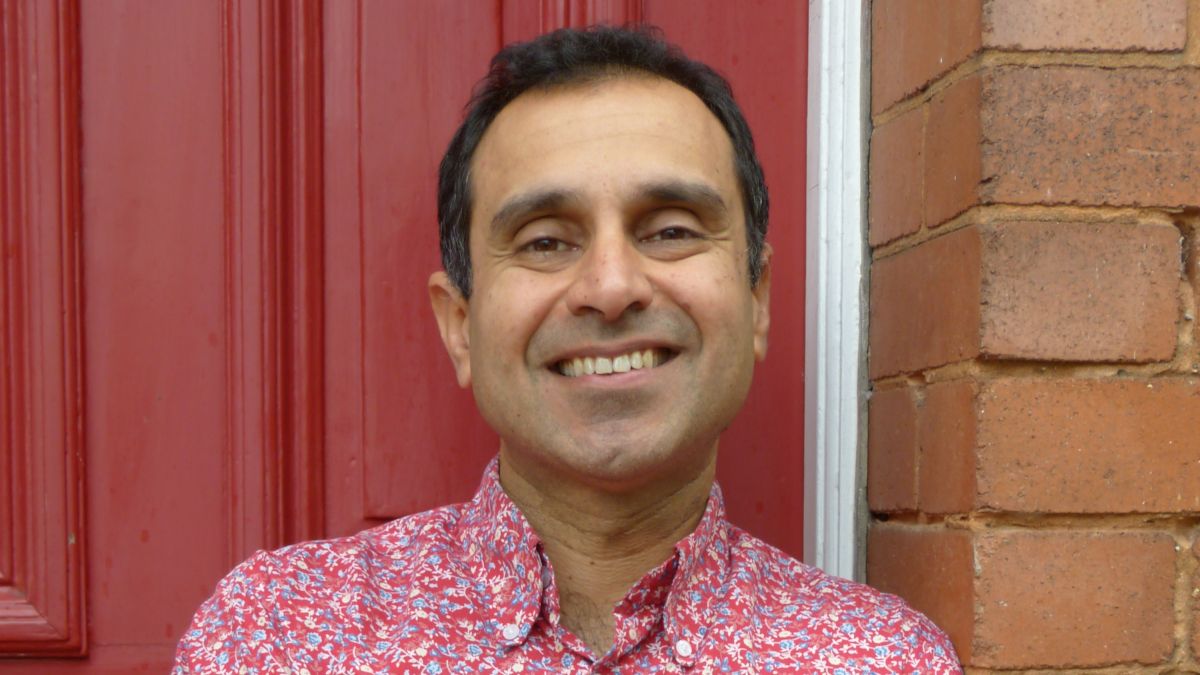
Next Up: Exploring the Healthy Heart of Environmental Education with Dr. Vik Mohan | S1 Ep 3
Dr. Vik Mohan unlocks the key to environmental, physical, and mental health with the best medicine: listening. Find out how listening, trust, and well-being have created a path to improved community partnerships and long-term health.
Image
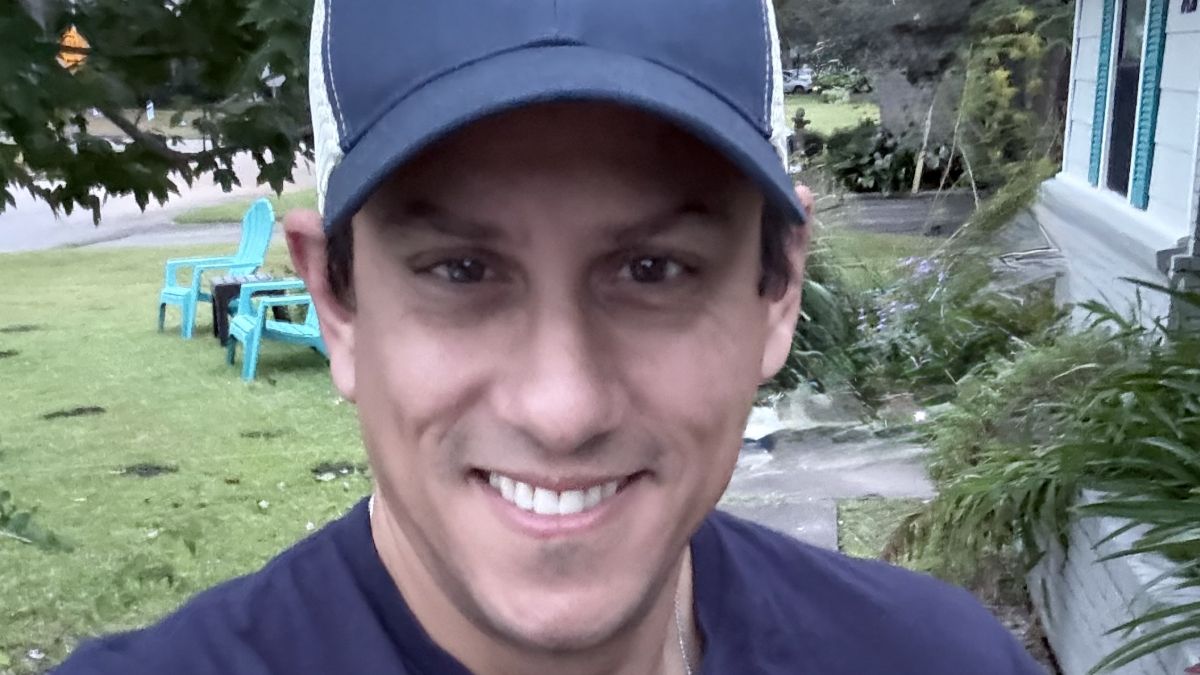
Conservation Education in an Urban Landscape with Jaime González | S1 Ep 1
Listen to Jaime talk about the importance of conservation in urban environmental, of belonging in the conservation field, and nurturing the "science of awe" in all of us.
Image
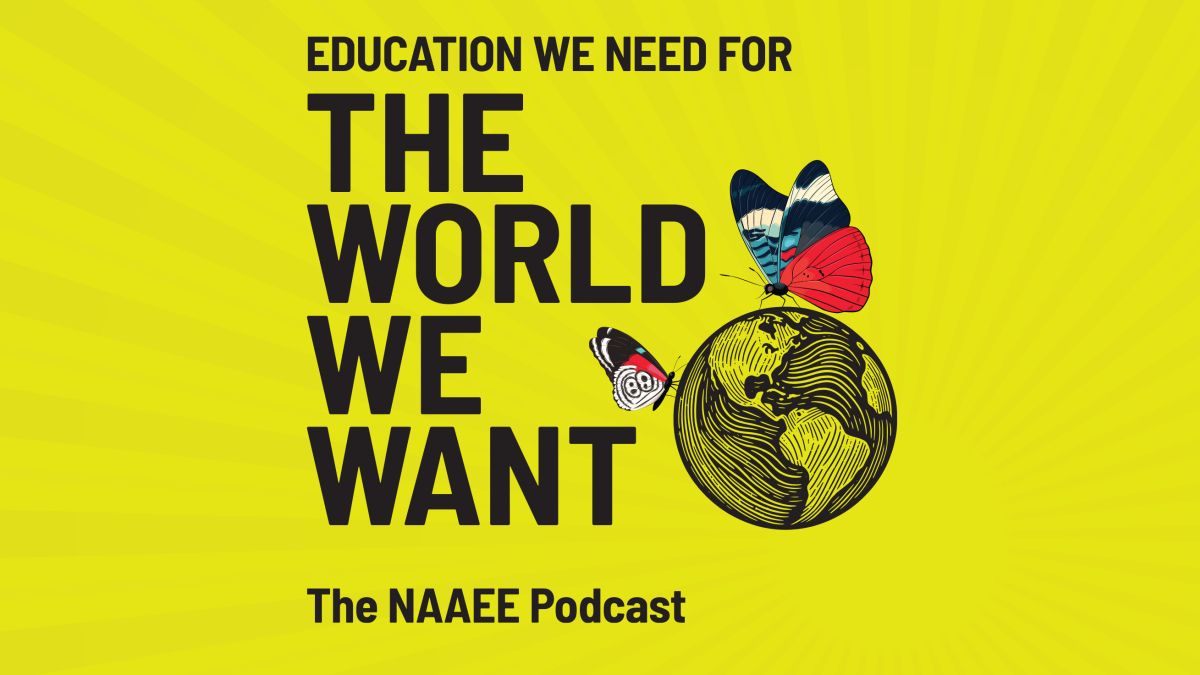
Imagine a world where communities thrive, curiosity sparks change, and hope fuels action. Welcome to The World We Want, the NAAEE podcast that's bringing a better future to life, one inspiring story at a time. Join us as we chat with people across continents and cultures who care about education and the environment—the trailblazers, visionary leaders, and everyday heroes making a difference.
Listen Now
Enjoyed This Episode?
Share your thoughts, takeaways, or resources you'd love to see featured by logging in or creating a free eePRO account.
